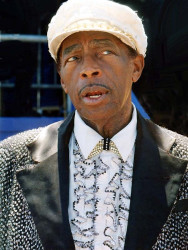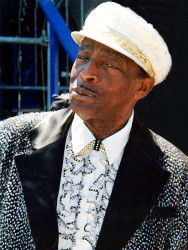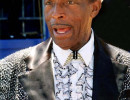Charles Brown
Charles Brown
Tony Russell "Charles" Brown (September 13, 1922 – January 21, 1999), born in Texas City, Texas was an American blues singer and pianist whose soft-toned, slow-paced blues-club style influenced the development of blues performance during the 1940s and 1950s. He had several major hit recordings, including "Driftin' Blues" and "Merry Christmas Baby".
As a child, Brown demonstrated his love of music and took classical piano lessons. He graduated from College in 1942 with a degree in chemistry. He then became a high school chemistry teacher in Texas, a mustard gas worker in Arkansas, and an apprentice electrician at a shipyard in California before settling in Los Angeles in 1943.
In Los Angeles, the great influx of blacks created an integrated nightclub scene in which black performers tended to minimize the rougher blues elements of their style. The blues club style of a light rhythm bass and right-hand tinkling of the piano and smooth vocals became popular, along with Johnny Moore's Three Blazers, featuring Charles Brown's gentle piano and vocals.
Brown signed with Aladdin Records and his 1945 recording of, "Driftin' Blues", with a small combo on that record label went on the U.S. Billboard R&B chart for six months, putting Brown at the forefront of a musical evolution that changed American musical performance. "Driftin' Blues" was the first of several hits. Brown subsequently released "Get Yourself Another Fool", "Black Night", "Hard Times" and "Trouble Blues", all major hits in the early 1950s. Though he was unable to compete with the burgeoning rock and roll sound that was increasing in popularity, he managed to maintain a small, devoted audience. Additionally, his songs were covered by the likes of John Lee Hooker, Lowell Fulson, and practically every blues singer since.
Brown's approach was too mellow to survive the transition to rock's harsher rhythms, and he faded from the national limelight. His "Please Come Home for Christmas", a hit in 1960, remained seasonally popular, selling over one million copies by 1968, and was awarded a gold disc that year. During the 1960s, Brown recorded a couple of albums for Mainstream Records. In the 1980's he made a series of appearances at New York City nightclub Tramps. As a result of these appearances, he signed a new recording contract with Blue Side Records and recorded "One More for the Road" in three days. Blue Side Records closed soon after but distribution was picked up by Alligator Records. Soon after the success of "One More for the Road", Bonnie Raitt helped usher in a Charles Brown comeback tour.
He began a recording and performing career again, under the musical direction of guitarist Danny Caron, to greater success than he had achieved since the 1950s. Several records received Grammy Award nominations. He is a member of the Rock and Roll Hall of Fame and received both the National Endowment for the Arts' National Heritage Fellowship and the W. C. Handy Award.
Brown died of congestive heart failure in 1999 in Oakland, California
On a very personal note: Hanging around by the side of the stage at the 1994 River Blues in Philadelphia, I spotted Charles Brown standing next to the stage steps and shouted "Mr. Brown!" Looking over at me, he came over and we had a 20-minute conversation listening to stories of his past, Bonnie Raitt, his career, and so on. He needed no encouragement to start a new story, and his stories were truly delightful. The head of the festival approached and said, "Mr. Brown, you're on!" Looking over at him, Charles calmly said, "Just a minute. I am talking with a friend." He went back to finishing his story, smiled, shook my hand, and climbed the stairs taking the stage. (A moment for me that truly defines the word 'Priceless'.)
(Charles Brown at Philadelphia's River Blues Festival 1994)

















